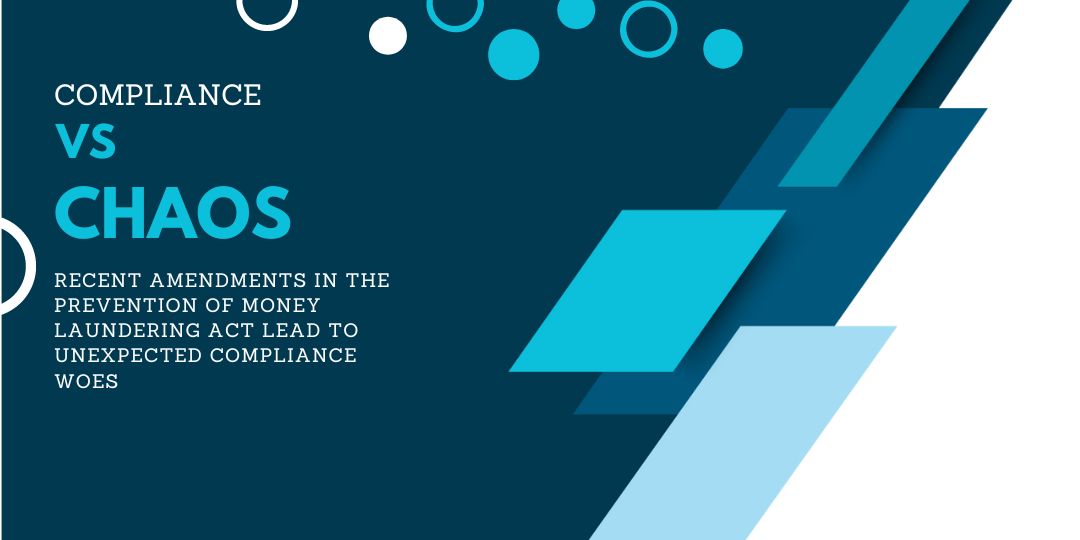COMPLIANCE VS CHAOS: RECENT AMENDMENTS IN THE PREVENTION OF MONEY LAUNDERING ACT LEAD TO UNEXPECTED COMPLIANCE WOES

K. Anupriya
Consultant – Corporate Compliance
The integrity of the global financial system and societal well-being are recently being seriously threatened by the acts of money laundering, financing of terrorism, and the spread of weapons of mass destruction. The Financial Action Task Force (FATF), founded in 1989, plays a significant role in establishing global standards and implementing practical solutions to stop these illegal acts. The Prevention of Money Laundering Act (PMLA), which India passed in 2002 in accordance with the FATF’s recommendations, is a key piece of legislation that guides the nation’s efforts to combat money laundering and other associated financial crimes. The PMLA is instrumental in safeguarding the integrity of India’s financial system and preventing the misuse of funds for unlawful activities. Recognizing the evolving nature of financial crimes, the Indian Government has recently introduced significant changes to the PMLA, further strengthening its effectiveness. These amendments aim to address emerging threats and ensure that the legislation remains robust and adaptable in the face of a changing world.
One of the key catalysts for the recent changes to the PMLA was the Chinese loan apps scam, which involved certain accounting professionals facilitating the establishment of shell companies for these apps. These professionals utilised their office addresses, even becoming directors and gaining access to bank accounts of these shell companies. Unfortunately, personal data of loan recipients was compromised, leading to grave concerns regarding privacy and security. In response, the Indian government took swift legal action against the professionals involved and imposed appropriate disciplinary measures against them. To prevent such scams and enhance accountability, the Central Government recently further extended the coverage of the PMLA, emphasising the government’s commitment to combat money laundering and related offences across various sectors.
A New Era in Combating Money laundering
The PMLA places obligations on certain ‘Reporting Entities’. According to the PMLA, the term ‘Reporting Entity’ refers to banking companies, financial institutions, intermediaries, and persons carrying on designated business or profession. Further, the PMLA elaborates the concept of ‘Person carrying on designated business or profession’ to include individuals engaged in activities related to playing games of chance for cash or kind, including those associated with casinos. It also covers the Inspector-General of Registration appointed under the Registration Act, real estate agents, dealers in precious metals and stones, individuals engaged in safekeeping and administration of cash and liquid securities on behalf of others, and any other activities designated by the Central Government through notifications. The Central Government possesses the authority to notify additional persons or activities that can be covered under the ambit of the PMLA. This power allows the government to adapt the legislation to changing circumstances and emerging risks in the financial sector. In this regard, two notifications were issued on 03rd May, 2023 and 09th May, 2023, indicating the government’s proactive approach in expanding the coverage of the PMLA to address the evolving challenges effectively.
PMLA widens scope to include Professionals
According to the notification dated 03rd May, 2023 issued by the Government of India, the PMLA now applies to practising Chartered Accountants, Company Secretaries, and Cost and Management Accountants if they carry out any financial transactions on their clients’ behalf. It is important to note that this notification specifically applies only to financial transactions involving money, and not every transaction. Further, the particular transaction should have been done in the course of his or her profession. Mere facilitation of a transaction is insufficient for the PMLA to be applicable. The following specific transactions which were included in the said notification:
- buying and selling of any immovable property;
- managing of client money, securities or other assets;
- management of bank, savings or securities accounts;
- organisation of contributions for the creation, operation or management of companies;
- creation, operation or management of companies, limited liability partnerships or trusts, and buying and selling of business entities.
The exact scope and definition of these activities have not been clearly outlined in the notification. For example, what acts constitute the activity of managing client’s money, what act is termed as activity of management of companies has not been clearly defined and laid down. As a result, the lack of clarity creates an impression that all and any activity falling under these broad categories may potentially be covered under the ambit of the PMLA. It is essential for further guidelines or clarifications to be provided to ensure a clear understanding of the specific acts that constitute these activities and to avoid any ambiguity in the interpretation of the law.
Further, another pertinent point to not here is that these notifications do not apply to advocates and lawyers who undertake such financial transactions on behalf of their client in the course of their profession. This exemption is based on the recognition that advocates and lawyers are already covered by the client-attorney privileged communication, which is a fundamental principle of the legal profession. The client-attorney privilege ensures that confidential information shared between a lawyer and their client remains protected, fostering trust and facilitating open communication necessary for effective legal representation. By excluding advocates and lawyers from the PMLA amendments, the legislation acknowledges the importance of preserving this privilege and upholding the principles of legal confidentiality.
PMLA expands scope to include certain specific activities
One week after the previous notification, the Government of India vide notification dated 09th May, 2023, included certain additional specific activities to be included under the scope of the PMLA. The reporting entities carrying out the activities mentioned in this notification are collectively referred to as the ‘Trust and Company Service Providers’ (TCSP). The specific activities covered under this notification are listed below.
- The amendment expanded the scope of the PMLA to include individuals who act as formation agents for companies and limited liability partnerships. However, it’s important to note that this provision does not apply to activities conducted by advocates, chartered accountants, cost accountants, or company secretaries in practice, engaged in the formation of these entities, to the extent of filing the required declaration under the Companies Act, 2013. This amendment aims to enhance the regulation and oversight of individuals involved in the formation of legal entities, while ensuring appropriate exemptions for qualified professionals engaged in similar activities within their professional capacity. While the amendment addresses the inclusion of formation agents, it does not provide a clear definition or clarification regarding the term ‘formation agent’.
- The PMLA now encompasses individuals who act as directors, secretaries, or hold similar positions in companies, firms, or limited liability partnerships, either directly or by arranging for another person to act in such capacity. However, it explicitly excludes activities carried out by employees on behalf of their employers within the course of their employment or in relation to their employment. This provision ensures that employees performing their designated duties as part of their employment responsibilities are not subject to the provisions of the PMLA. By focusing on individuals in positions of authority or influence within business entities, the PMLA aims to strengthen measures against money laundering while maintaining a clear distinction between employees and those in key decision-making roles.
- The scope of PMLA has been expanded to include individuals who provide registered offices, business addresses, accommodations, correspondence addresses, or administrative addresses for companies, limited liability partnerships, or trusts. However, an exemption exists for activities related to lease agreements, sub-lease agreements, tenancy agreements, or any other agreements or arrangements for the use of land, building, or space. This exemption applies if the consideration for such agreements is subject to the deduction of income tax. This provision ensures that individuals engaged in legitimate leasing or rental activities, where income tax deductions are applicable, are not brought under the purview of the PMLA. By focusing on specific arrangements and exempting certain transactions, the PMLA aims to target illicit activities while allowing for legitimate business operations to proceed unhindered.
- The PMLA extends its coverage to individuals who act as trustees for express trusts or perform similar functions for other types of trusts. It also encompasses individuals who act as nominee shareholders on behalf of others. However, it explicitly excludes any activities that are carried out on by intermediaries such as stock brokers, share transfer agents, and portfolio managers. merchant bankers, etc. By making this distinction, the Act aims to effectively address money laundering activities while differentiating between different roles and responsibilities within the financial system.
Unveiling the implications of the amendments
Recent changes to the PMLA have released a new wave of obligations and responsibilities for reporting entities that fall under its expanded purview in the fight against money laundering. These include stricter due diligence methods, improved reporting requirements, and increased monitoring and record-keeping obligations.
Reporting entities must implement comprehensive systems and procedures to verify the identity of their clients and the beneficial owners, including the collection of appropriate documentation and the adoption of advanced identity verification technologies. This can be done through online authentication using Aadhaar, offline verification using Aadhaar, use of passports, or other officially valid documents as notified by the Central Government.
Reporting entities are required to maintain records of all transactions in a manner that allows for reconstruction of individual transactions. The reporting entities should also maintain records of client and beneficial owner identities, account files, and business correspondence. Except as authorised by any applicable laws, all information that is retained, provided, or confirmed must be kept private and confidential. The records must be maintained for a period of five years from the transaction date, or for five years after the business relationship or account closure, whichever is later.
Apart from verifying the identity of clients prior to each transaction, the reporting entities must also examine the ownership, financial position, and sources of funds of the client, as well as record the purpose of the transaction and the intended relationship between the parties. If the client fails to fulfil the verification conditions, the reporting entity cannot proceed with the transaction. This enhanced due diligence is required to be conducted only for certain specified transactions such as cash withdrawals or deposits above a certain amount, foreign exchange transactions exceeding a specific threshold, etc. and is not applicable for all transactions.
If the reporting entities are satisfied that the transaction is suspicious, they have to report it to the Financial Intelligence Unit – India (FIU-IND), the central, national agency responsible for receiving, processing, analysing and disseminating information relating to suspect financial transactions to enforcement agencies and foreign FIUs. Also, all the reporting entities must register themselves on the FINNET 2.0 portal of the FIU-IND and appoint a Designated Director and Principal Officer on their behalf. The same has been re-emphasized by the FIU-IND in the recent notification released by them.
Conclusion
The recent amendments to the PMLA mark a significant step forward in strengthening the country’s financial security and combating money laundering and related financial crimes. By aligning with the recommendations of the FATF, India demonstrates its commitment to international standards and the fight against illicit activities that undermine the integrity of the global financial system. With these changes, a paradigm has shifted, requiring the reporting entities to adopt a variety of all-encompassing compliance procedures. However, it is essential for the government to provide clear guidelines and definitions that leave no room for ambiguity. Adequate training and resources must be provided to reporting entities, professionals, and law enforcement agencies to effectively implement the provisions of these amendments. Regular monitoring and evaluation mechanisms should be in place to ensure compliance and identify areas of improvement. While the recent amendments to the PMLA are a positive step forward, it is essential to recognize the existing gaps and work towards their resolution.
References:
- Notification No. S.O. 2036(E) released by the Department of Revenue, Ministry of Finance, Government of India dated 03rd May, 2023
- Notification No. S.O. 2135(E) released by the Department of Revenue, Ministry of Finance, Government of India dated 09th May, 2023
- Notification No. F. No.9-41/2022-23/Intermediaries/TCSP/FIU-IND released by the Financial Intelligence Unit-India, Department of Revenue, Ministry of Finance, Government of India dated 17th July, 2023.



